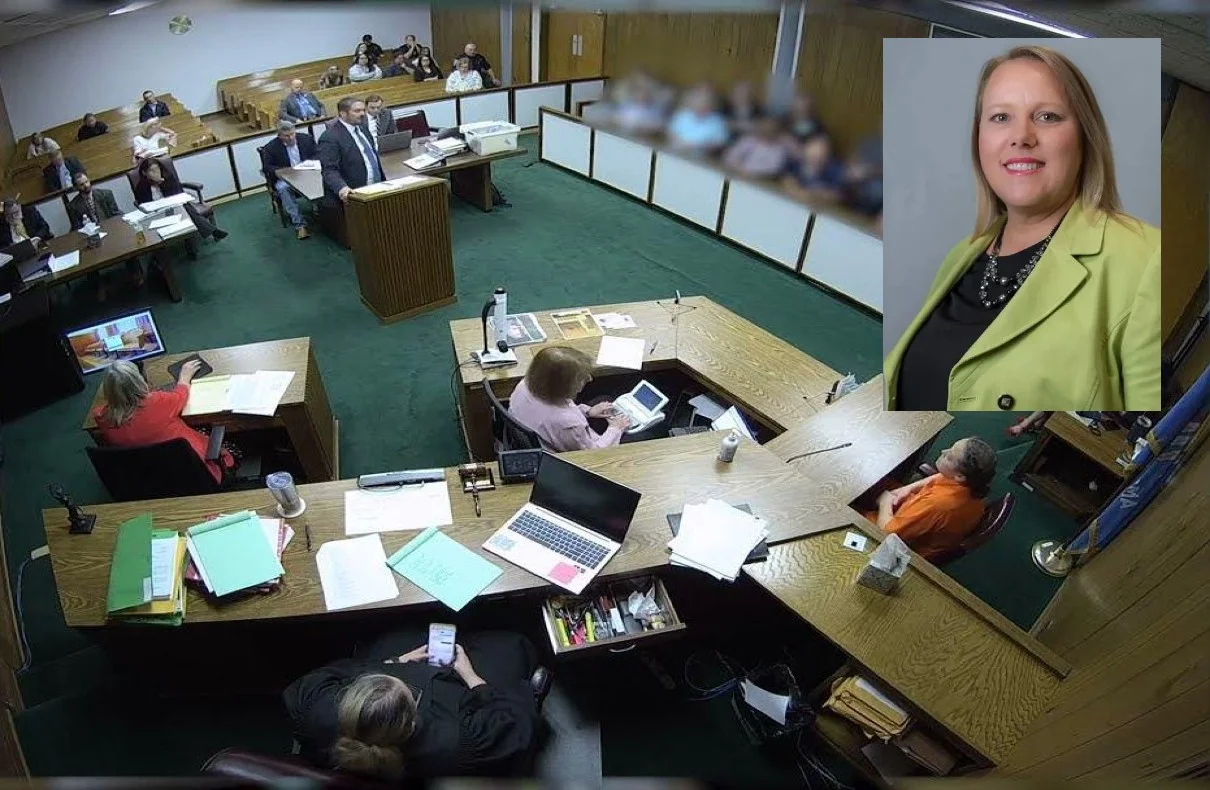
An Oklahoma judge has been caught in a scandal that has rocked the legal community. District Judge Traci Soderstrom, presiding over a high-profile murder trial, was found to have sent over 500 texts to her bailiff during the proceedings. These texts included personal comments about the prosecuting attorney, mocking remarks, and even references to the prosecutor’s genitals. As a result of this egregious behavior, Judge Soderstrom has resigned from her position and will never again seek a judicial office in Oklahoma.
The scandal came to light when security footage from the courtroom revealed Judge Soderstrom constantly texting or messaging on her cellphone. These actions took place during crucial moments of the trial, such as jury selection, opening statements, and witness testimonies. The texts, exchanged between the judge and her bailiff, contained inappropriate and unprofessional content that shocked those who witnessed the messages.
Oklahoma Supreme Court Chief Justice John Kane IV wasted no time in recommending the removal of Judge Soderstrom from the bench. Following an investigation into her conduct, which uncovered her mockery of prosecutors, laughter at inappropriate comments made by the bailiff, and calling the prosecutor’s key witness a liar, the Chief Justice determined that her actions constituted a “gross neglect of duty.” As a result, Judge Soderstrom faced the possibility of being removed from her position.
Instead of facing a trial that was scheduled to begin on Monday, Judge Soderstrom opted to resign. In a settlement agreement filed with the Oklahoma Court on the Judiciary, she agreed to step down from her role and never seek another judicial office in the state. This move effectively ends the controversy surrounding her texting scandal, but the impact of her actions will be felt for years to come.
The Legal Battle Surrounding Trump Fraud Case and the Judge’s Ruling
The murder trial that unfolded during Judge Soderstrom’s texting scandal involved the case of Khristian Tyler Martzall, who was accused of killing his girlfriend’s two-year-old son. Despite the distractions caused by the judge’s inappropriate behavior, Martzall was eventually convicted of second-degree manslaughter and sentenced to time served. However, the revelation of the judge’s misconduct raises questions about the fairness and integrity of the trial.
The legal community has been left stunned by the actions of Judge Soderstrom. The duty of a judge is to uphold the law, maintain impartiality, and ensure a fair trial for all parties involved. By engaging in such unprofessional and inappropriate behavior, Judge Soderstrom violated these fundamental principles and undermined the public’s trust in the judicial system.
Legal experts and observers have expressed their outrage and disappointment at Judge Soderstrom’s conduct. They argue that her actions not only compromised the integrity of the murder trial but also undermined the public’s confidence in the judicial system as a whole. Many are calling for further investigation and accountability measures to ensure that such misconduct does not occur again in the future.
The scandal surrounding Judge Soderstrom highlights the critical importance of maintaining strict ethical standards within the judiciary. Judges are expected to adhere to a code of conduct that ensures fairness, impartiality, and professionalism. When judges fail to uphold these standards, it erodes public trust and jeopardizes the integrity of the justice system.
While the scandal involving Judge Soderstrom has undoubtedly tarnished the reputation of the Oklahoma judicial system, it also serves as a reminder of the need for vigilance in upholding the highest standards of ethics and professionalism. It is crucial for judges to remember their duty to the public and the importance of maintaining the trust and confidence of those they serve.
In the wake of this scandal, it is imperative that the Oklahoma judicial system takes steps to strengthen oversight and accountability measures. This may include stricter guidelines for judge’s use of electronic devices during proceedings, increased training on ethical conduct, and more robust mechanisms for reporting and addressing misconduct.
Rebuilding public trust in the judiciary will require a concerted effort from all stakeholders. Judges must demonstrate their commitment to upholding the highest ethical standards, while legal professionals and the public should hold them accountable for their actions. Transparency, accountability, and a commitment to fairness and justice are the cornerstones of a trustworthy judicial system.
